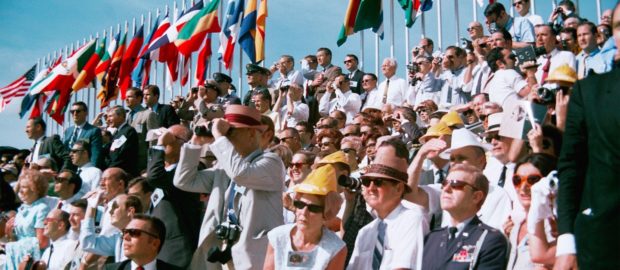
 A documentary by Todd Douglas Miller marking the 50th anniversary of the flight that first landed a man on the moon, features previously unseen film footage and audio from the mission.
A documentary by Todd Douglas Miller marking the 50th anniversary of the flight that first landed a man on the moon, features previously unseen film footage and audio from the mission.
It was only after the opening credits started playing for Apollo 11, a new documentary by Todd Douglas Miller, that it suddenly occurred to me that this year marks the 50th anniversary of the Apollo 11 mission, the first one to land a man on the moon. It seemed weird that I hadn’t thought of that before, but I’m guessing the fact that I remember the moon landing myself caused me to suppress from my mind how old I really am.
Last year we had a drama called First Man, that I reviewed here, portraying the life of Neil Armstrong. Apollo 11, however, is the real thing. Every bit of this film is from footage shot during that time, and it proves that no reenactments or special effects could ever equal the stupendous, mind-blowing record of what actually happened.
The film opens on the day that the mission was due to blast off—July 16, 1969—and we are taken through what seems like a long wait as the three astronauts—Armstrong, Michael Collins, and Buzz Aldrin—are transported to the rocket, and technicians at the Kennedy Space Center in Florida deal with some last minute glitches and repairs. There is some amusement when we see people waiting in the stands at Cape Canaveral for the take-off, with all the beehive hairdos, pointy sunglasses, and other aspects of 1960s style—and even Johnny Carson shows up and mingles with the onlookers. We then follow the flight for its eight-day duration, into orbit, off to the moon, then the landing by Armstrong and Aldrin, and finally the return to Earth.
Near the beginning of the film we hear newscaster Walter Cronkite, in his dignified, reassuring tones, describing the world-changing importance of the upcoming mission—and this was familiar to me, because I remember the event through the prism of Cronkite on the TV. But then the director, Miller, makes an interesting decision. We don’t hear Cronkite again until briefly near the end of the film. More importantly, we don’t get narration, or interviews, or any kind of explanation from people looking back. The film stays resolutely in the present tense with footage from NASA headquarters in Houston, from the spacecraft itself, and of course, from the moon. When Apollo has to make certain maneuvers, for example moving out of the Earth’s orbit to head to the moon, or docking with the lunar module when it returns from the moon’s surface, we are shown simple animated diagrams displayed by NASA at the time to illustrate what is being done.
In addition to the film that already existed, the producers stumbled on a treasure trove of 65 millimeter footage, and more than 11,000 hours of audio recordings of the mission. From this huge mass of material, Miller has meticulously crafted an exciting record of the voyage. Sometimes he’ll employ split-screen to show what the astronauts are doing alongside the words and actions of the various teams on the ground. The movie overwhelms the senses with awe while also emphasizing the reality. I wouldn’t say a mundane or ordinary reality, but just the concrete realization that this achievement did occur, and that it took a lot of coordinated effort by a lot of people to make it happen.
Over and above the human drama, we have the incredible power of the engines pushing the rockets into space, and the literally unearthly views from space and the lunar surface. The widescreen format provides the proper perspective for viewers of this amazing real-life spectacle. And as you might expect, it’s also showing in some IMAX theaters. Apollo 11 demonstrates that science is stranger, and more beautiful, than fiction.

